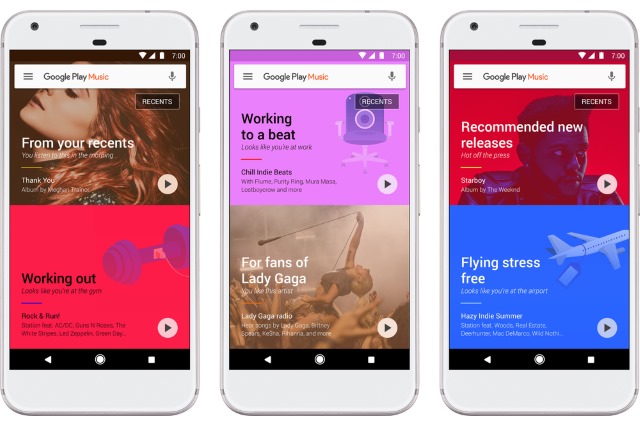
Optimizing your website for Google's mobile-first index
Google have begun rolling out their new mobile-first index. This update will prioritize the mobile version of your website for its ranking signals, falling back on the desktop version when there is no mobile content. In short, this means Google will create and rank its search listings based on the mobile version of content (even for listings that are shown to desktop users).
If you have neglected mobile SEO in the past, it’s now more important than ever that you up your game. Here are 10 tips to future-proof your website, and make sure it succeeds in the new mobile-first index.

Free online test can tell if you're 'pre-disposed' to negative or bad behavior
In the 2002 movie Minority Report, a law enforcement squad called "Precrime" arrests future criminals before they commit their act. Imagine if businesses could predict the future behavior of potential employees before hiring (or not hiring) them? That’s what Veris Benchmarks’ products aim to achieve.
The company also offers Veris Prime, is a free online test that you can take for yourself, and which measures your personal trustworthiness and shows how your results compare to white collar criminals.

Revamped Google Sites now let anyone create websites for free
Google Sites recently underwent something of a redesign and it was made available to a select group of testers. Now the website building tool is available for everyone to use.
For anyone who has used any of Google's online apps, Sites will be immediately familiar. Like so many web building tools, it eschews HTML in favour of a WYSIWYG interface, meaning that even web novices can get a site up and running easily.

The new Google Play Music rolls out to Android, iOS and the web
Starting today, Google is rolling out an updated version of Google Play Music, its streaming music service. The company says that the update sees the use of machine learning to create contextual playlists based on where listeners are and what they are doing.
The latest version of Google Play Music is more "assistive" than ever, with Google making much of the personalized playlists it is able to automatically create.

Google updates its site verification process to flag 'repeat offenders'
Google has decided to rework the way it classifies dangerous and harmful sites in an effort to better protect users from being infected by malware.
The search engine has tried to protect its users for a number of years by displaying a warning when a link appears that could lead them to an unsafe site trying to infect their systems with malware or trying to obtain their personal information through phishing.

Google fails to patch Chrome browser bug -- Microsoft Windows users at risk of scams
Many people use Google Chrome, and rightfully so. The cross-platform web browser works brilliantly, and is super-fast. Plus, the search-giant's browser is very secure too, right? Not so fast...
Today, Sophos drops a bombshell by revealing that scammers are actively targeting Chrome users by leveraging a bug. These bad guys pose as Microsoft tech support and display an in-browser message that says the user's computer is infected with "Virus Trojan.worm! 055BCCAC9FEC". To make matters worse, Google has apparently known about the exploit for more than two years and simply failed to patch it.

How Western businesses should manage their websites in China
The idea that the Chinese market is emerging is an idea that firmly belongs in the past -- while online gaming is worth $22 billion, the construction market is worth a staggering $2 trillion. Cross-border ecommerce sales -- consumers from China buying goods from outside China -- is expected to reach just under a trillion US dollars in 2016. Outbound tourists from China reached 120 million in 2015, and they spent $104.5 billion around the globe.
Internet usage and access in China is growing, despite the restrictions in connectivity the region faces. Even though the Great Firewall of China can block certain types of content completely, making websites inaccessible and cause long load times, according to China Internet Watch there were 667 million internet users spending around 25 hours a week online in 2015 -- and this is only set to grow further. Combine these trends -- the necessity of digital commerce and the rise of China as a viable target market -- and then suddenly Western businesses need to carefully scrutinize how their brand presents online.

SEO alert: Google search to rank sites according to their mobile versions
Having recently said that it will show different search results to mobile and desktop users, Google now has another search related announcement. Reacting to the fact that most searches are conducted from mobile devices, search results will be ranked according to sites' mobile content.
Google says that it has "begun experiments to make [its] index mobile-first", and it's a move that essentially says that mobile searchers are more important than the rest. In light of the recent splitting of mobile and desktop indexing, the announcement is hardly a bolt out of the blue, but it's still something that many site owners will need to take action about.

Google: HTTPS usage is rising among Chrome users
Google is actively pushing websites to embrace HTTPS, going as far as to warn Chrome users when they visit a page that can transmit sensitive data over the unsecured HTTP protocol. The search giant hopes that this will speed up HTTPS adoption, and to help us keep track of how things evolve it has updated its Transparency Report to reveal how HTTPS usage is increasing among Chrome users.
Google says that the majority of pages that Chrome users access on desktops are now loaded via HTTPS, and two thirds of their time is spent on pages loading the secure communications protocol. The platform with the highest rate is Chrome OS, which is approaching the 75 percent mark.

Grim London is an interactive guide to the very worst of the city's past
London is a fantastic city, with a long, and fascinating history. While you may be aware of many of the famous people who called the city their home in the distant past, there are thousands more infamous characters whose misdeeds you likely haven’t heard of. People like The Witch of Wapping, The Blackout Killer, and 'Lord Minimus'.
Created in time for Halloween, digital creative agency Impero has put together an interactive horror map of London, chronicling the city’s creepy past. What may appear to be a normal house to a passing tourist, might well have been built on a plague pit, or once been a baby farmer’s residence.

How can form analytics help businesses increase conversions?
A form is one of the most important elements on many websites because it is where conversions happen, leads are created, and relationships begin.
According to MarketingCharts, Lead Gen forms have an average conversion rate of just 17 percent. As dismal as these numbers are, the good news lies in the immense opportunity left by the 83 percent of visitors who do not convert on forms -- and the data-driven solution to help win over more of them.

Google releases open source 'Nomulus' TLD registry platform
Google is one of the biggest champions of open source, releasing very useful projects such as Cartographer and Noto. Heck, the company is so proud of its open source efforts, that it graded itself with a public report card.
Today, the search giant releases yet another open source tool. Called "Nomulus", it is designed to be a top-level domain (TLD) registry platform. This is not a young or incomplete project, however, as Google began developing it way back in 2011. Now that Nomulus is in the wild and free to use, it will be interesting to see how it is leveraged.

Most websites have security vulnerabilities
Dangerous vulnerabilities are present in a large number of today's websites, and the percentage is only going to keep on growing, according to a new report by Acunetix.
The automated web application security software company released its annual Web Application Vulnerability Report 2016, based on 45,000 website and network scans, done on 5,700 websites over the past year. The results are worrying.

Google.com gets safer with HTTP Strict Transport Security (HSTS)
For any site you visit nowadays, HTTPS should be offered by default. I don't care about the content of the site -- there is no reason to go HTTP only in 2016. Security matters, folks.
Google.com -- one of the world's most popular domain names -- is aiming to get even safer by implementing HSTS. The search giant has recently enabled this technology for the benefit of its users, and it should start paying security dividends immediately.

UK government websites will default to HTTPS
Starting October 1, all government digital services (GDS) websites will be required to use HTTPS encryption, according to new security guidelines.
All services will additionally have to publish a domain-based message authentication, reporting & conformance (DMARC) policy that will be applicable to their email systems.
